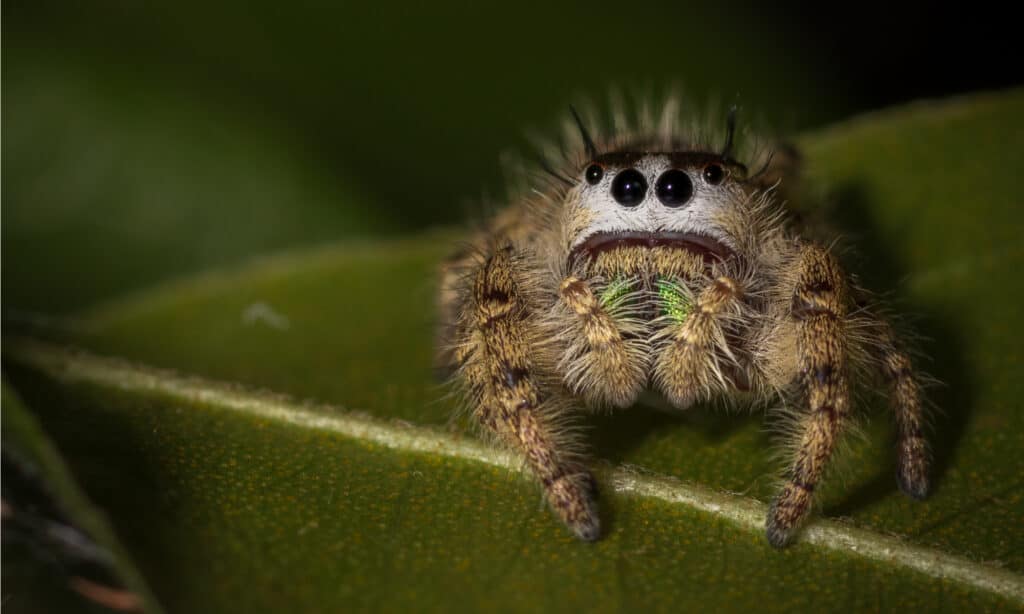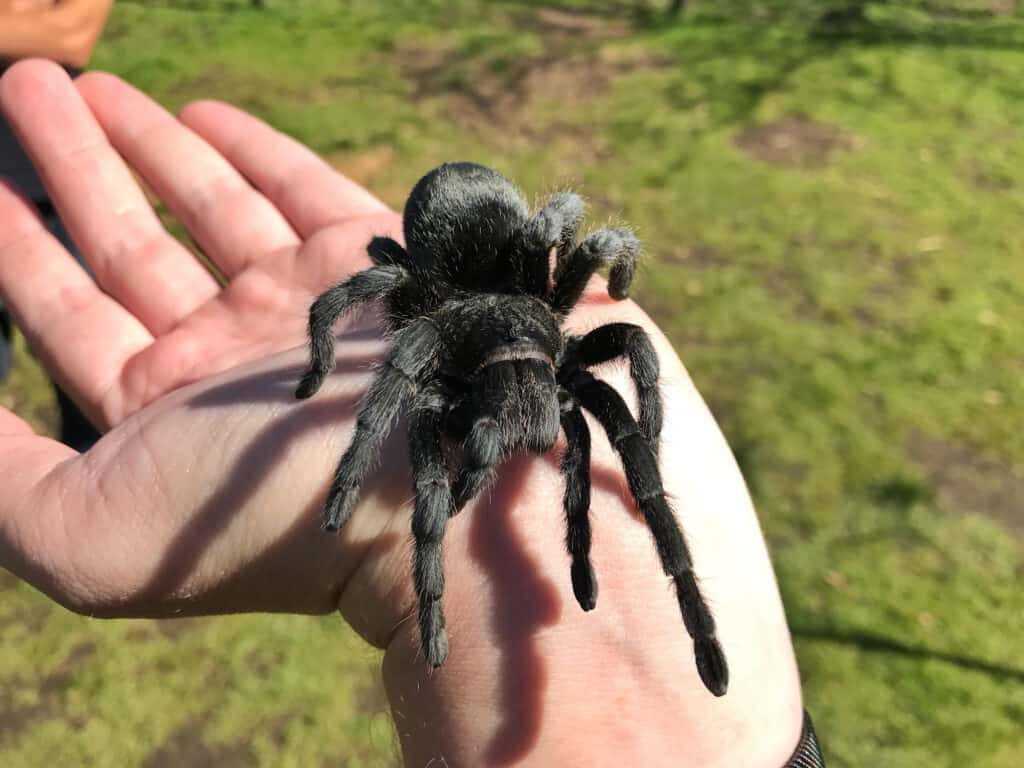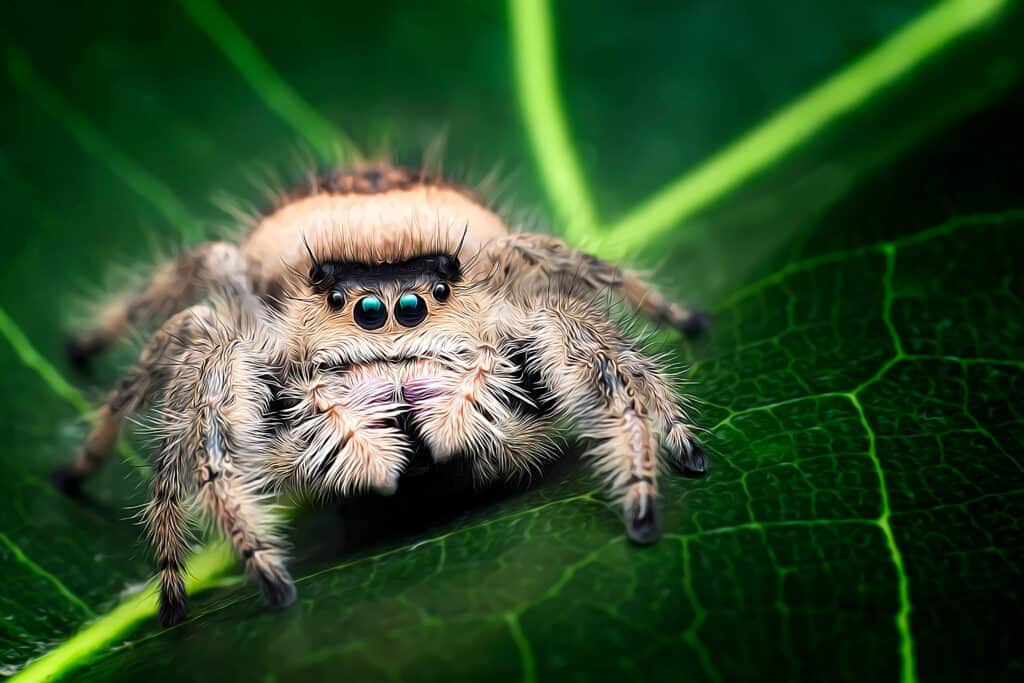Keeping spiders as a hobby breeder or just because you love them is not for everyone. Those who enjoy it sometimes don’t know how toxic some ordinary and otherwise thought-harmless things can be around our homes. They aren’t just harmful to spiders; they can be detrimental to humans, cats, dogs, rodents, hedgehogs, and many other animals we love. Pet spiders and toxins do not mix. As pet owners, we must keep our pets happy and healthy.
It’s hard to understand what is safe and what isn’t for us and our animal friends when products are cleverly labeled in a way that leads us to believe everything is healthy because it’s natural. Toxic mold is also natural, but we don’t want to breathe it in! Let’s look at a few things that are very harmful to our eight-legged friends and what we can do to avoid it.
Harmful Toxins That Can Kill Spiders

Pet spiders need proper care, just like any other pet.
©OBX Wildlife/Shutterstock.com
Scented Candles, Oil Diffusers, Wax Melts
These are especially harmful because they linger in the air and any surface they contact, which is anything in the room. It can also get sucked into your air return in you have central ac and heat. If that happens, it will be dispersed throughout your home. The natural or chemical oils in the melts, candles, and diffusers leave a residue in the air that will cause neurological symptoms in spiders.
Incense and Smoke
Incense and smoke harm everyone, even if they are “all natural.” The smoke will leave a residue all over everything it touches, including the container your spiders live in. It is also terrible for other pets’ and humans’ sensitive systems and noses. These can also cause neurological issues in your pet spider, and once they have shown the first neurological symptom, their time is numbered, and the outcome is always death.
Cleaning Products
Cleaning products should always be used in a well-ventilated space for a reason. They contain highly harmful chemicals. Our lungs are on the inside of our bodies and much larger than a spider’s book lungs located on the outside of their bodies. They also cannot cough or sneeze to expel the smells or chemicals. It is best to relocate your spiders until the cleaning is finished and the smell has dissipated for at least several hours. This includes cleaners that you may not be able to smell or are “all natural.”
Scented Sprays and Perfumes
The same goes for these nice-smelling sprays. Whether spraying a bit of a breeze or using body spray or perfume, please keep it away from your spiders! It’s okay to do this in a room where the scent will dissipate quickly, but never where they are kept.
Topical Flea and Tick Treatment
This one is a major no-no and is deadly. You may think your spider friends are safe in another room where furry pets never go. This is incorrect; trying it out to see will likely cost your spiders their lives. We will go further into the neological disorder your little buddies will suffer from if they come into contact with topical flea treatments later in the article. It is a horrible end to your pet’s life and not something you will want to witness.
It is insect poison when you choose to use a topical flea treatment. The topical treatment doesn’t disappear from your pet once it’s absorbed. You can still pick up traces of it on your clothing in their shredded fur. More so, pets have dander, which you probably won’t be able to see. The dander ends up all over everything in your home. It can quickly enter your spider’s room on your hands or clothing.
Vinegar
Vinegar is a natural insecticide that can have deadly consequences for spiders. Never clean the enclosures or the room using vinegar. Other household cleaners can be just as fatal, so be sure to remove them from the room if you need to use cleaners, natural or otherwise.
Diatomaceous Earth
Diatomaceous earth is trickier because it can also be transferred to your spiders via clothing or the air. It is best to never use it at home or in your yard because it is finer than baby powder and tends to end up everywhere, whether you like it or not. DE also kills all invertebrates, including insects that are important to the ecosystem. It acts as tiny razor blades that cut through the fragile exoskeletons of insects and arachnids. Their body’s fluids leak out, and they die. Sounds pretty horrible, right?
It may be an all-natural alternative to insecticide, but it is more like a complete genocide of every living bug in your yard and home. It also comes with a severe warning about breathing it in. Once it gets in your lungs, it cannot get out, leading to a nasty type of pneumonia. Some people can have severe breathing issues due to it. It’s also impossible to eradicate once it’s spread.
Essential Oils
Essential oils are deadly to most living things. That is why so many are used in making natural bug sprays and insect repellants for plants. It’s not that insects will avoid it due to the smell; when they come in contact with essential oils, they will likely have neurologic side effects that could result in death. Spiders cannot rid their bodies of toxins, so it’s best to avoid this one altogether.
The Results of Toxins on Pet Spiders

It’s best to avoid anything that produces a strong aroma or contains chemicals if you have pet spiders.
©iStock.com/Willem Van Zyl
Most, if not all, items on our list can or will cause neurological issues in spiders. The syndrome, known as Dyskinetic Syndrome, or DKS for short, is lethal to those it affects. It attacks the central nervous system of spiders of all sizes and types. The infected spider starts to show slightly jerky movements that will progress over days or weeks until the spider cannot walk, catch food, or drink water. They will become mostly paralyzed and may flip over onto their backs anytime they try to walk or move.
At that point, you can do nothing as your spider will become unable to move or drink. They will dehydrate over time and die. It is not truly a disease but symptoms caused by something attacking your spider’s central nervous system.
Final Thoughts

By taking on a pet, their life is in your hands.
©Fauzan Maududdin/Shutterstock.com
By keeping chemicals and other harmful substances away from your spiders, you are setting up a healthy environment where they can live safely and thrive. It can be challenging to know everything you should and shouldn’t do when adopting a pet for the first time. This is why it is always important to do plenty of research and talk to other owners of tarantulas or jumping spiders to gain further perspective on the hobby. We all want you and your spider to have lots of healthy time together!
The photo featured at the top of this post is © Sari ONeal/Shutterstock.com
Thank you for reading! Have some feedback for us? Contact the AZ Animals editorial team.







